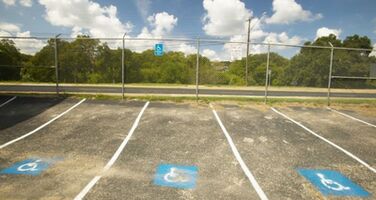
Myths vs. Facts: Debunking Common Misconceptions about Handicap Placards in Missouri
Disability tags, also known as handicap placards or permits, play a vital role in making public spaces accessible to individuals with disabilities. These tags ensure people with mobility challenges can park closer to entrances, helping them access essential services, jobs, and social activities with ease. However, disability tags are often misunderstood, and many myths and misconceptions surround their use, eligibility, and rules in MO. This article aims to debunk some of the most common myths, clarify the facts, and offer a better understanding of the importance of handicap placards in Missouri for those who genuinely need them.
Introduction to Handicap Placards in Missouri
In MO, disability tags are issued by the Missouri Department of Revenue (DOR). These tags, which include both passes and license plates, are designed to help individuals with disabilities access public spaces by providing parking privileges close to entrances. However, misuse and misinformation can create challenges for those who truly need these tags. This article seeks to clarify common misconceptions and educate MO residents on the proper use and significance of disability tags.
Types of Disability Tags in Missouri
MO offers several types of handicap permits to accommodate various needs:
Temporary Disability Tags:
- For individuals with short-term disabilities, such as recovery from surgery or an injury.
- Valid for up to six months and renewable if the condition persists.
Permanent Disability Tags:
- For individuals with long-term or lifelong disabilities.
- Valid for four years and must be renewed periodically.
Disability License Plates:
- Permanently affixed to vehicles owned by individuals with disabilities or their families.
- Offers the same privileges as tags and is convenient for those who use one primary vehicle.
Disabled Veteran Plates:
- Available for veterans with service-connected disabilities.
- Includes similar benefits and may feature additional recognitions of military service.
Eligibility Criteria for Disability Tags in Missouri
To qualify for a disability tag in MO, applicants must have a condition that significantly limits their mobility. A licensed physician, chiropractor, podiatrist, or advanced practice registered nurse (APRN) must certify the condition.
Common Qualifying Conditions Include:
- Inability to walk more than 50 or 200 feet without stopping to rest.
- Severe respiratory or cardiac conditions that restrict mobility.
- Dependence on portable oxygen.
- Use of a wheelchair, cane, walker, crutches, or other assistive devices.
- Severe orthopedic, neurological, or arthritic impairments.
The certification ensures that only individuals who genuinely need the accommodations receive a disability tag.
Application Process for Handicap Placards in Missouri
Applying for a Missouri handicap placard involves completing the required form, obtaining medical certification, and submitting the application to the Department of Revenue.
Step-by-Step Application Process
- Download the Application for Missouri Personalized and Special License Plates (Form 1776) from the DOR website.
- Alternatively, pick up a form at a local DOR office.
Complete the Applicant Section:
- Fill out personal information, including name, address, and contact details.
- Specify the type of tag (temporary, permanent, or license plate) you are applying for.
- Have a licensed healthcare provider complete the medical certification section of the form.
- Ensure they provide detailed information about your condition and its impact on your mobility.
Submit the Application:
- Mail or bring the completed application to a local DOR office.
- Include any required fees for license plates or replacement tags.
Fees:
- Temporary and Permanent Tags: Typically issued free of charge.
- Disability License Plates: Standard vehicle registration fees apply.
Processing Time:
- Applications are usually processed within a few weeks. Approved tags are mailed to the applicant’s address.
How to Obtain a Permit Online with HandicapMD.com
HandicapMD.com offers a convenient telehealth service that simplifies the process of getting your disabled parking permit by allowing you to:
- Sign Up: Visit the HandicapMD.com website and fill out the necessary form to schedule a consultation.
- Consultation: A certified doctor will assess your medical records and determine whether you meet the eligibility criteria.
- Medical Certification: The doctor will complete the certification section of the Application for Missouri Personalized and Special License Plates (Form 1776).
- Submit Your Application: Once your form is completed, submit it to the state's DMV either in person or by mail.
Why Getting the Permit Online is Beneficial
- Convenience: With HandicapMD.com, you don’t need to visit a doctor’s office. You can complete the entire process from home.
- Expertise: HandicapMD doctors specialize in understanding ADA guidelines and determining eligibility for disabled permits, ensuring a smoother process.
- Efficiency: The service allows for quick evaluations, helping you get your permit faster than traditional method.
Renewal Process for Disability Tags in Missouri
Renewing your disability tag is essential to maintain uninterrupted access to accessible handicap parking. The renewal process depends on the type of tag:
Temporary Tags:
- Validity: Up to six months.
- Renewal: Requires updated medical certification if the condition persists beyond the initial period.
Permanent Tags:
- Validity: Four years.
- Renewal: Renewal notices are generally sent by the DOR before expiration. New medical certification is not typically required for renewal.
Disability License Plates:
- Renewal: Renewed alongside standard vehicle registration. Renewal intervals depend on the vehicle’s registration cycle, typically one or two years.
Common Myths and Facts About Handicap Placards in Missouri
Handicap placards are surrounded by misinformation, often leading to confusion and misuse. Let’s explore and debunk some of the most common myths:
Myth #1: Disability Tags Are Only for People Who Use Wheelchairs
Fact: While many people who use disability tags rely on wheelchairs, MO’s eligibility requirements extend to a broader range of mobility impairments and medical conditions. Disability tags are issued to individuals with conditions that severely limit their ability to walk, including:
- Cardiac, pulmonary, or orthopedic conditions
- Severe arthritis or other musculoskeletal conditions
- Visual impairments or neurological disorders that affect mobility
Those who use canes, crutches, walkers, or have limited endurance may also qualify. It’s important to recognize that disabilities aren’t always visible, and many individuals may have “invisible” disabilities that impact their mobility.
Myth #2: Disability Tags Provide Unlimited Free Parking Everywhere
Fact: Disability tags allow parking in designated accessible spaces, but they do not provide free parking in all locations. The state's law allows disability tag holders to park in accessible spaces but does not cover private parking lots, restricted zones, or metered spaces unless specifically indicated. Some municipalities may allow extended parking or waive meter fees for tag holders, but this varies and requires verification with local regulations.
While the tag grants access to specific reserved parking spots, it does not give permission to park in loading zones, fire lanes, or other restricted areas.
Myth #3: Anyone with a Disability Tag Can Park in Any Reserved Space
Fact: Disability tags in MO are designated for the exclusive use of the person to whom the tag was issued. The tag holder must be present, either as the driver or as a passenger, for the tag to be valid. Allowing someone else to use the tag, even if they’re running errands for the disabled person, is considered misuse and may result in penalties. Misusing a disability tag not only jeopardizes parking privileges but also contributes to a shortage of accessible parking for those who genuinely need it.
Myth #4: Temporary Disabilities Don’t Qualify for Disability Tags
Fact: MO recognizes that temporary disabilities can create significant mobility challenges, which is why the state offers temporary disability tags. These temporary tags are issued to individuals with conditions expected to improve within six months, such as post-surgical recovery, a broken leg, or other short-term impairments. Temporary tags must be certified by a licensed physician, and if the condition persists, the tag can be renewed upon re-certification.
Myth #5: Disability Tags Can Be Shared Among Family Members
Fact: Disability tags are strictly for the use of the individual with the qualifying disability. Sharing a tag among family members, even if they provide transportation for the disabled person, is considered a misuse. In MO, disability tags are tied to the individual, not the vehicle. To prevent misuse, only the person with the disability can use the tag, and they must be present in the vehicle when the tag is displayed. Misuse of a disability tag can lead to penalties, fines, and potential revocation of the tag.
Myth #6: Only the Elderly Are Eligible for Disability Tags
Fact: Disability tags are not age-specific; they are issued based on mobility limitations, not age. People of all ages can experience disabilities that qualify them for a disability tag. For instance, younger individuals with congenital disabilities, those who have undergone surgery, or individuals with certain chronic conditions are equally eligible. Eligibility is based on the severity of mobility impairment, as verified by a licensed healthcare provider, regardless of the applicant’s age.
Myth #7: Disability Tags Are Issued Without Verification
Fact: In MO, obtaining a disability tag requires certification from a licensed healthcare provider. This certification verifies that the applicant has a qualifying condition that limits mobility. MO uses the Disabled Person Placard/License Plate Application form (Form 2769) for disability tags. This form requires a physician’s signature, and healthcare providers are held to strict guidelines when certifying eligibility.
The rigorous verification process ensures that only those who truly need disability tags receive them, preventing abuse and maintaining the integrity of accessible parking spaces.
Myth #8: Disability Tags Are Easy to Get Without a Real Disability
Fact: MO has strict eligibility criteria for disability tags, requiring medical certification from a licensed healthcare provider. Applicants must provide proof of a qualifying condition, ensuring that only those with legitimate needs receive these tags.
Myth #9: All Disabilities Qualify for a Tag
Fact: Not all disabilities meet the criteria for a tag in MO. Eligibility is based on specific conditions that significantly impair mobility, such as the inability to walk a certain distance or the use of mobility aids.
Myth #10: Disability Tags Never Expire
Fact: Disability tags have expiration dates. Permanent tags must be renewed every four years, while temporary tags expire after six months and require renewal if the condition persists.
Benefits of Having a Disability Tag in MO
Disability tags provide numerous benefits that significantly enhance mobility, independence, and accessibility for eligible individuals.
1. Access to Designated Parking Spaces
Disability tags grant access to accessible parking spaces closer to entrances, reducing the distance individuals need to walk.
2. Extra Space for Mobility Devices
Accessible parking spaces provide additional room for vehicles with ramps, lifts, or other mobility aids.
3. Statewide and Nationwide Recognition
MO disability tags are recognized across the state and in most other U.S. states, offering seamless parking access when traveling.
4. Enhanced Independence
Having a disability tag reduces reliance on others, enabling individuals with mobility challenges to navigate public and private spaces more independently.
5. Benefits for Caregivers
Caregivers transporting individuals with disabilities can use the tag to park closer to destinations, simplifying the process of loading and unloading mobility aids.
Legal Consequences of Misusing a Disability Tag
Misusing a disability tag in MO carries legal consequences, including:
- Fines: First-time offenses can result in fines, with repeat offenders facing even steeper penalties.
- Tag Confiscation: In severe cases of misuse, the disability tag may be confiscated, and privileges revoked.
- Potential Criminal Charges: Deliberate misuse or fraudulent activity, such as using a tag issued to a deceased individual, can result in criminal charges.
MO's enforcement of these penalties helps prevent misuse, keeping accessible spaces available for those who genuinely need them.
FAQs About Disability Tags in MO
Q1: Can I use my MO disability tag in other states?
Yes, most states honor MO disability tags, allowing access to accessible parking spaces across the U.S. However, rules on metered parking and time limits may vary by state, so be sure to check local regulations when traveling.
Q2: Do I need to renew my permanent disability tag?
Yes, permanent tags must be renewed every four years. The Missouri DOR typically sends renewal reminders, but it’s advisable to track your expiration date.
Q3: Can someone else apply for my disability tag on my behalf?
Yes, a representative can apply on behalf of the disabled individual as long as they provide the completed and certified application form.
Q4: Do disability tags grant free parking at all meters?
Not necessarily. MO does not automatically grant free parking at meters statewide. Some municipalities may provide exemptions, so check local policies to avoid fines.
Q5: Are disability tags transferable to other family members?
No, disability tags are issued specifically to individuals with disabilities and cannot be transferred to others. Allowing someone else to use your tag is considered misuse and may lead to fines or revocation.
Q6: How can I replace a lost or stolen disability tag?
If your disability tag is lost or stolen, contact the state's DOR and submit a replacement application. You may be required to provide identification and a new application form.
Q7: Do I need a new medical certification to renew my permanent disability tag?
No, permanent disability tags generally do not require new medical certification for renewal unless specified by the DOR.
Q8: Are there fees for disability tags in MO?
Temporary and permanent tags are typically issued free of charge. Disability license plates may require standard vehicle registration fees.
Q9: Can I lend my disability tag to someone else?
No, disability tags are issued to individuals and are non-transferable. Lending your tag to others is illegal and can result in penalties, including revocation of the tag.
Q10: How long does it take to receive a disability tag after applying?
Processing times vary, but most applications are completed within a few weeks. Contact your local DOR office for updates if processing is delayed.
Q11: Can I have both a disability tag and a disability license plate?
Yes, MO allows individuals to have both a tag and a license plate, offering flexibility for using multiple vehicles.
Q12: Can I park in any space with a disability tag?
No, disability tags only permit parking in designated accessible parking spaces. Parking in fire lanes, loading zones, or other restricted areas is still prohibited.
Conclusion: Supporting Accessibility with Disability Tags
Handicap placards in Missouri provide critical support for individuals with mobility challenges, granting them access to accessible parking spaces and enhancing their independence. However, it’s essential to understand the rules and responsibilities associated with these tags to use them correctly and avoid misuse.
By debunking common myths and providing accurate information, this guide helps both tag holders and the public appreciate the value of disability tags and the importance of preserving accessible parking spaces for those who genuinely need them. If you or a loved one qualifies for a disability tag, contact the state's Department of Revenue to start your application process and enjoy the benefits of a more accessible lifestyle.
.png)






